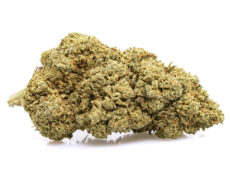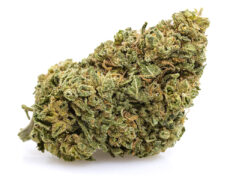Modified on: 08/10/2024
RICK SIMPSON OIL: EVERYTHING YOU NEED TO KNOW
If you have decided to open this article it means that you are also part of that group of curious people who would like to know more about Rick Simpson’s oil, right?
Many have wondered whether it is actually a beneficial product such as CBD oil and, above all, whether its presence of THC makes it dangerous.
-
 SMALL & BIG
SMALL & BIGBUBBLEGUM
Starting from: 1,25CHF/gIndoor | CBD – CBDA <22%
Grams3 5 10 20 50 100 -



DO SI DOS
Starting from: 2,00CHF/gIndoor | CBD – CBDA < 19%
Grams3 5 10 20 50 100 -



ROYAL GG#4
Starting from: 2,30CHF/gIndoor | CBD – CBDA < 40%
Grams3 5 10 20 50 100 -



GORILLA GLUE
Starting from: 2,90CHF/gIndoor | CBD – CBDA < 20%
Grams3 5 10 20 50 100
So, how are things really?
In this article we will try to understand together what RSO is, how it is produced and what its potential benefits are.
Do you already have the impression that this article is right for you?
Let’s begin!
Let’s get to the point: what is RSO?
Simply put, RSO is an oil derived from cannabis, containing all of the cannabinoids, terpenes, and additional compounds from the entire plant.
The extraction process is complex and rather long, similar to preparing a dye, the color is typically close to black and, apparently, the flavor is not great due to the high amount of plant matter.
RSO recipes typically call for high-THC, indica-dominant cannabis (although CBD-rich options exist). THC binds to the CB1 receptors of the endocannabinoid system, most of which are concentrated in the brain and nerve cells and, when this happens, it appears to have a significant role in reducing chronic pain.
In fact, RSO was created as a therapeutic medicine for cancer and other chronic health conditions, such as multiple sclerosis and asthma.
Although Rick Simpson no longer produces the oil himself, it remains a key ingredient in patient treatment plans across North America.
Yes, that’s right, Rick Simpson.
But who is this person from whom the oil took its name?
Read also: Mother plant – Marijuana: definition and characteristics


The Rick Simpson Story
Rick Simpson didn’t want to become a marijuana icon.
He was a Canadian engineer working in a hospital in 1997, tasked with working on some asbestos-covered pipes inside a boiler. The poor ventilation and toxic fumes caused him to faint and caused him to fall down the stairs.
Soon after he developed tinnitus and dizziness, and no prescribed medication seemed to help him. Despite his illegality and against the advice of his doctor, Simpson began using medical marijuana which immediately proved to be very beneficial and capable of alleviating his symptoms.
In 2003, he was diagnosed with basal cell carcinoma, a type of skin cancer.
By then, Canada had legalized medical cannabis, but Simpson found it difficult to find a doctor who supported its use. Simpson has always claimed that by applying RSO to his skin and leaving it bandaged for four days he cured himself of cancer, although this has not been scientifically verified.
From that moment he began to mass produce the oil and distribute it free of charge to thousands of patients. In 2009, his property was raided by the Royal Canadian Mounted Police and thousands of cannabis plants were confiscated.
To escape legal persecution, Simpson now lives in Croatia and runs a website for his RSO recipe, dosage guide and his books.
He suffered a stroke in 2018 and has since retired from public life, but continues to advocate for RSO and medical cannabis.
The benefits of RSO
Despite Rick Simpson’s near-miraculous recovery from cancer and tinnitus, the scientific community currently has no research to support these claims.
However, there have been promising reports attesting to the effectiveness of RSO, such as a 2013 article demonstrating how its use significantly reduced leukemia cells in a 14-year-old terminally ill patient, without toxic side effects.
Additionally, RSO has helped patients manage conditions such as:
multiple sclerosis;
epilepsy;
cancer;
insomnia;
chronic pain;
asthma.


As an incredibly potent THC product, RSO offers potential therapeutic effects, such as pain relief and appetite stimulation, and may help induce sleep and nausea. But because no studies have been conducted, we cannot guarantee that RSO provides these benefits.
Despite the high concentration of THC, no amount of this oil can cause overdose, death, or lasting side effects. The risks associated with taking RSO are the same as those associated with taking a high dose of any cannabis product, such as an edible, concentrate, or more than the prescribed amount of the product.
In short, there is no need to worry.
A 2021 study indicated that although many cancer patients use cannabis in conjunction with cancer treatments, their primary care teams have not figured out how to integrate light hemp into a regimen.
It’s clear that much more research needs to be done on how to best use RSO to amplify treatment.
Finally, among other possible benefits, it appears that RSO can help soothe back pain.
In fact, one of the most frequent uses of RSO – and cannabis in general – is chronic pain. Back pain is one of the most common forms of physical pain, with as many as 80% of people experiencing it at some point in their lives.
Read also: Everything you need to know about hotboxing
Conclusions
In this article we have seen what is meant by Rick Simpson Oil (RSO), what is the story behind its creator and what are the possible medical uses of this oil.
If you are looking for quality products, such as CBD hashish, visit our Justbob CBD shop.
We are waiting for you on Justbob!






